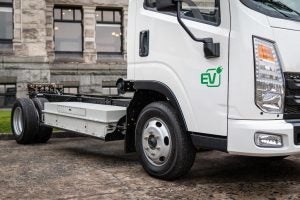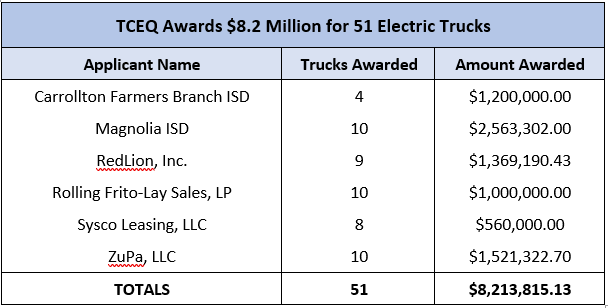 The Texas Commission on Environmental Quality has awarded $8.2 million in state incentives to help companies operating in Texas purchase 51 electric trucks.
The Texas Commission on Environmental Quality has awarded $8.2 million in state incentives to help companies operating in Texas purchase 51 electric trucks.
The announcement is a win for communities, the climate and the companies who secured the historic funding opportunity. The announced funds should signal to companies across the country that clean fleet investments are now part of the package of economic incentives that make Texas such an attractive place to do business.
The agency’s funding for electric vehicles is a direct result of coordinated efforts by EDF and industry partners to request a guaranteed set-aside for funding of zero-emission trucks in the agency’s Texas Clean Fleet Program. It also comes at a time when national momentum continues to build and dollars from the Inflation Reduction Act become available, which will accelerate the momentum in Texas as more fleets begin transition plans for their companies.
Texas Awards $8 Million In State Incentives For Electric Trucks Click To Tweet
Overall, Texas has enjoyed $2.2 billion of announced investments in electric vehicle manufacturing, with at least 4,600 jobs created by the nearly 50 Texas-based EV supply chain companies in the state. In many ways, Texas is already one of the national leaders in ZEV truck manufacturing:
- Navistar, in San Antonio, has committed that 50% of the trucks they make in Texas will be zero-emission by 2030.
- Peterbilt, in Denton, is building and sending out its 579EV regional electric trucks around the country, including to ports in South Carolina, Georgia and Oakland — and recently put two of the same trucks in place in the DFW market via a lease for Truck King put together by PacLease Dallas.
- Hyliion, based in the Austin area, is currently performing tests on a new hybrid zero-emission truck that utilizes a fully-electric drivetrain and can travel 1,000 miles — with geo-fencing that allows it to go electric in areas with severe ozone pollution.
The progress with fleets, manufacturers and state agencies in Texas is encouraging —especially when considered with recent reports of how investment in ZEV infrastructure will benefit utilities, fleets and the broader rate paying public.
The cost of upgrading the electrical infrastructure required to make a commercial site ready for EV charging can account for up to 30% of the total cost of charging for fleets. Most U.S. utilities and regulators have been wary of financing these grid upgrades for fear of needing to raise everyone’s electricity rates to pay for them, but a new EDF study debunks this myth. The study, released earlier this week, finds that utilities covering upfront costs for fleet charging infrastructure can actually increase utilities’ revenue — while lowering electricity rates for consumers and accelerating electric fleet adoption.
The transition to ZEV trucks will also help Texas’ environmental air quality. TCEQ estimates that “mobile sources to be responsible for more than half of NOx emissions in certain non-attainment areas in Texas.” The Houston-Galveston region, home of Port Houston — the state’s largest port — is currently under moderate nonattainment status for the 2015 ozone standard, and severe nonattainment status for the 2008 standard. Houston, Dallas, San Antonio, El Paso, McAllen and Laredo are all on the American Lung Association’s Most Polluted Cities list for 2023.
EDF continues to work with TCEQ and other state agencies to advance ZEV truck infrastructure and investments in the state. This includes testifying before the Legislature on the need to approve adding as much as $76 million a year to the Texas Emission Reduction Program, administered by TCEQ. We must ensure that all Texans can breathe air free of the pollution caused by heavy-duty diesel engines.


